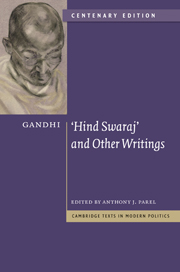Book contents
- Frontmatter
- Contents
- Preface to the centenary edition
- Acknowledgements
- Editor's introduction to the centenary edition
- Editor's introduction to the 1997 edition
- A note on the history of the text
- Principal events in Gandhi's life
- Biographical synopses
- Guide to further reading
- Glossary and abbreviations
- HIND SWARAJ
- Contents
- Preface to the English translation
- Foreword
- I The Congress and its officials
- II The Partition of Bengal
- III Discontent and unrest
- IV What is Swaraj?
- V The condition of England
- VI Civilisation
- VII Why was India lost?
- VIII The condition of India
- IX The condition of India (cont.): railways
- X The condition of India (cont.): the Hindus and the Mahomedans
- XI The condition of India (cont.): lawyers
- XII The condition of India (cont.): doctors
- XIII What is true civilisation?
- XIV How can India become free?
- XV Italy and India
- XVI Brute force
- XVII Passive resistance
- XVIII Education
- XIX Machinery
- XX Conclusion
- I APPENDICES
- SUPPLEMENTARY WRITINGS
- Bibliography
- Index
XVI - Brute force
Published online by Cambridge University Press: 05 October 2014
- Frontmatter
- Contents
- Preface to the centenary edition
- Acknowledgements
- Editor's introduction to the centenary edition
- Editor's introduction to the 1997 edition
- A note on the history of the text
- Principal events in Gandhi's life
- Biographical synopses
- Guide to further reading
- Glossary and abbreviations
- HIND SWARAJ
- Contents
- Preface to the English translation
- Foreword
- I The Congress and its officials
- II The Partition of Bengal
- III Discontent and unrest
- IV What is Swaraj?
- V The condition of England
- VI Civilisation
- VII Why was India lost?
- VIII The condition of India
- IX The condition of India (cont.): railways
- X The condition of India (cont.): the Hindus and the Mahomedans
- XI The condition of India (cont.): lawyers
- XII The condition of India (cont.): doctors
- XIII What is true civilisation?
- XIV How can India become free?
- XV Italy and India
- XVI Brute force
- XVII Passive resistance
- XVIII Education
- XIX Machinery
- XX Conclusion
- I APPENDICES
- SUPPLEMENTARY WRITINGS
- Bibliography
- Index
Summary
reader: This is a new doctrine: that what is gained through fear is retained only while the fear lasts. Surely, what is given will not be withdrawn?
editor: Not so. The Proclamation of 1857 was given at the end of a revolt, and for the purpose of preserving peace. When peace was secured and people became simple-minded, its full effect was toned down. If I ceased stealing for fear of punishment, I would recommence the operation so soon as the fear is withdrawn from me. This is almost a universal experience. We have assumed that we can get men to do things by force and, therefore, we use force.
reader: Will you not admit that you are arguing against yourself? You know that what the English obtained in their own country they have obtained by using brute force. I know you have argued that what they have obtained is useless, but that does not affect my argument. They wanted useless things, and they got them. My point is that their desire was fulfilled. What does it matter what means they adopted? Why should we not obtain our goal, which is good, by any means whatsoever, even by using violence? Shall I think of the means when I have to deal with a thief in the house? My duty is to drive him out anyhow. You seem to admit that we have received nothing, and that we shall receive nothing by petitioning. Why, then, may we not do so by using brute force?
- Type
- Chapter
- Information
- Gandhi: 'Hind Swaraj' and Other Writings , pp. 77 - 85Publisher: Cambridge University PressPrint publication year: 2009

